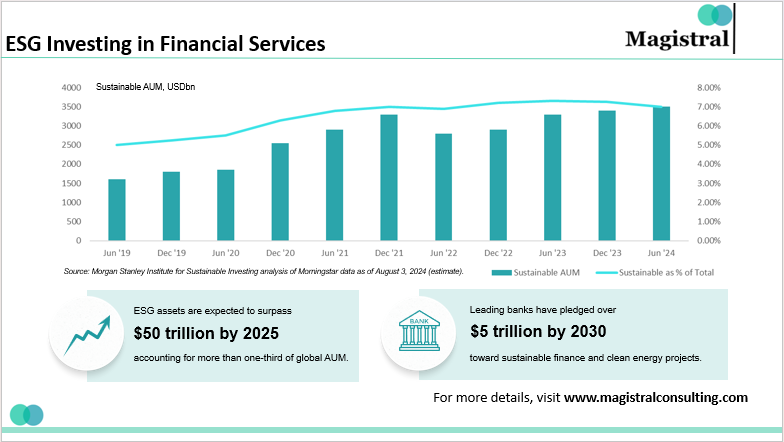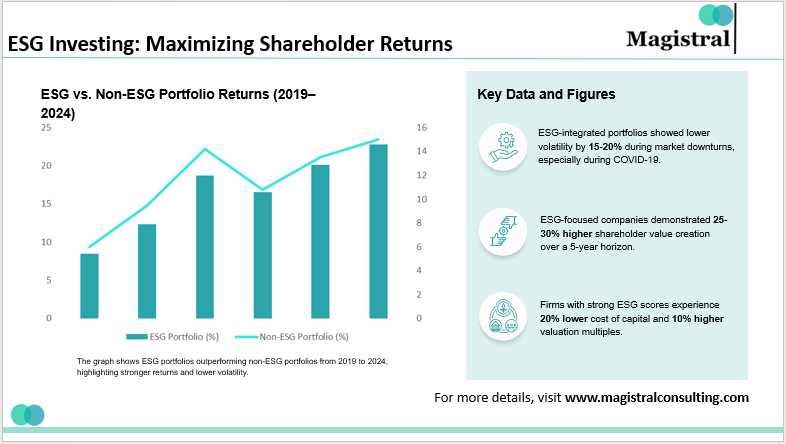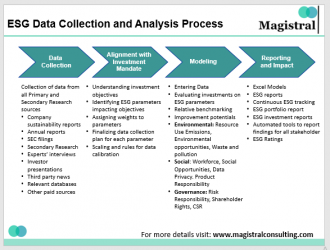As demands for sustainability are observing a surge, financial services firms are no exception as contributors. While not being a direct point of contact with the damage, these firms still contribute a fair share of harm via their investment and lending practices. Like many asset managers, banks, and insurance companies, fund projects that involve deforestation, fossil fuel projects, and other high emission producing projects that indirectly contribute to the climate change. The “Banking on Climate Chaos 2024” report indicates that the world’s 60 largest private banks have financed about $6.9 trillion in fossil fuels since the 2016 Paris Agreement, with $705 billion spent in 2023 alone. Significantly, close to half of the total, or $3.3 trillion, has gone toward fossil fuel growth projects. The data given make ESG investing equally important for the financial sector in contrast with the non-financial sector.
In the financial world, ESG investing reduces the risk of financing destructive industries and increases long-term stability, whereas in the non-financial world, it promotes operational sustainability and ethical business practices.

ESG Investing in Financial Services
A recent report by Morgan Stanley revealed that sustainable funds outperformed traditional funds in the market. As per the report, AUM for sustainable funds grew to $3.5 trillion as of June 2024, 3.9% above year-end 2023 and 7.7% higher year-over-year, a record high. This is 7.0% of the total. Globally, AUM is a bit lower at 7.2% to end 2023 and 7.3% at 1H2023, predominantly evidencing stronger inflows into the Classic fund universe.
Even after having multiple bodies for regulation, the embedding of sustainability within key financial decision-making continues to be uneven, with calls for more robust regulatory regimes and improved climate-related disclosure transparency.
Risk Mitigation and Long-Term Value Creation Through ESG Integration
Identifying and Mitigating Financial and Operational Risks
The incorporation of ESG investing enables firms to detect and reduce various financial and operational risks that consume long-term value.
Environmental risks, such as climate change and resource depletion, subject firms to regulatory sanctions, supply chain disruptions, and asset devaluation. According to an S&P Global report, firms with high emissions and weak environmental practices experienced 15-20% higher volatility during market downturns.
Social risks, such as poor labor practices and weak diversity policies, result in reputational loss, legal liabilities, and talent attrition. Backed by the Harvard Business Review, companies with poor diversity and inclusion face 25% more reputational crises.
Governance risk, in the form of unethical management or poor oversight, heightens the risk of fraud, regulatory sanctions, and shareholder unrest. A World Bank report revealed that companies with weak governance practices have a higher likelihood of corporate fraud, which can lead to a 10-15% drop in the share price.
Organizations that actively manage such risks via robust ESG investing do not just insulate themselves from unexpected interruption but also become resilient, promoting stakeholder confidence and business stability in the long term. Research by MSCI during the COVID-19 pandemic revealed that ESG-based portfolios performed 5.6% better than the overall market in Q1 2020, proving the risk-buffering impact of ESG integration during times of crisis.
Enhancing Long-Term Value and Shareholder Returns
Beyond mitigating the risk, ESG also drives long-term financial performance and shareholder value. Research consistently indicates that firms with robust ESG practices outperform others by optimizing operational efficiency, improving stakeholder relations, and driving innovation.

ESG Investing: Maximizing Shareholder Returns
Sustainability-focused firms tend to have competitive benefits, like lower regulatory risks, enhanced brand reputation, and access to new markets. In times of market uncertainty, firms with strong ESG investing exhibit higher resilience, as they are more equipped to deal with crises and respond to changing circumstances.
In addition, ESG-focused firms are more likely to attract long-term institutional investors looking for sustainable returns, enhancing their risk profile and decreasing the cost of capital.
Case Study
Unilever’s Sustainable Living Plan (USLP) in 2010 embedded sustainability into the heart of Unilever’s business strategy through efforts to lower the environmental footprint, enhance health and well-being, and improve livelihoods. USLP had by 2024 contributed 75% of the growth of Unilever, with brands from the USLP portfolio, like Dove and Hellmann’s, growing much more rapidly than other brands. This approach not only enhanced business efficiency and lowered costs but also raised brand loyalty and consumer confidence. Unilever’s success shows how integrating business strategy with sustainability principles and the right ESG investing can drive long-term profitability and provide superior shareholder returns.
Future-Proofing Business Models
As customers increasingly insist on sustainable goods and responsible business practices, companies that focus on environmental and social responsibility establish deeper brand loyalty and gain long-term market share. To support ESG investing, the PwC Global Consumer Insights Survey (2023) revealed that 76% of consumers are willing to switch brands to support companies that demonstrate sustainability and ethical practices, and 55% of global consumers say they are willing to pay up to 10% more for sustainable products.
In addition, investing in ESG-led innovation unlocks new business models and income streams. Sustainable products, expanding 2.7x more quickly than traditional ones, are anticipated to power a $420 billion market by 2025 (Statista, 2024). Circular economy patterns might produce $4.5 trillion by 2030, while investments in renewable energy broke through $1.7 trillion in 2023 (Bloomberg NEF, 2024). ESG-based subscription services had 23% increased retention and 15% increased revenue growth, while impact-based financial products were growing 35% each year (McKinsey, 2024).
Case Study
In 2024, Tesla continued to be a dominant force in the electric vehicle (EV) market by delivering 1.79 million EVs, just ahead of BYD, which delivered 1.76 million EVs. Tesla’s market capitalization was around $1.4 trillion, indicating sustained investor faith in its sustainable business model and growth through innovation. The worldwide EV market saw substantial growth, expanding by 25% and reaching 17.1 million units sold in the year. However, competition in the EV sector grew fierce, with BYD deepening its international footprint and planning for aggressive overseas expansion. This changing environment underscores the necessity for Tesla to continue its emphasis on ESG investing, technological innovation, and operational excellence to hold its competitive advantage and long-term market leadership position.
ESG investing is moving beyond past exclusionary screening towards impact investing, in which investors are actively pursuing quantifiable environmental and social impacts. There is increasing focus on climate resilience and net-zero targets, with investment in nature-based solutions and climate-resilient infrastructure projected to reach more than $1.5 trillion by 2025.
Sustainability-linked loans and bonds, which totaled over $1 trillion in issuance by 2023, are picking up speed with performance-driven incentives. Regulatory authorities such as the SEC and EU Taxonomy are insisting on tighter ESG disclosures, whilst forthcoming ISSB standards will encourage worldwide consistency and lower risks of greenwashing.
Technological Advancements
Artificial intelligence (AI) and big data are improving ESG analytics by enabling real-time risk identification, whilst the Taskforce on Nature-related Financial Disclosures (TNFD) is encouraging investor attention to biodiversity and natural capital. Moreover, diversity, equity, and inclusion (DEI) initiatives are attracting substantial investment, with more than $250 billion planned for deployment by 2025, acting as a major step towards ESG investing.
Clean energy innovation, and in particular green hydrogen, is also a high-growth space becoming a $200 billion market by 2030. Retail investor engagement is also growing through the availability of fractional investment and ESG-themed robo-advisors, further opening up sustainable investing. Finally, the shift towards the circular economy is also tapping into potential economic value worth $4.5 trillion by 2030, fueling waste reduction and sustainable business, and marching the world towards a better way of living via ESG investing.
About Magistral Consulting
Magistral Consulting has helped multiple funds and companies in outsourcing operations activities. It has service offerings for Private Equity, Venture Capital, Family Offices, Investment Banks, Asset Managers, Hedge Funds, Financial Consultants, Real Estate, REITs, RE funds, Corporates, and Portfolio companies. Its functional expertise is around Deal origination, Deal Execution, Due Diligence, Financial Modelling, Portfolio Management, and Equity Research
For setting up an appointment with a Magistral representative visit www.magistralconsulting.com/contact
About the Author
The article is authored by the Marketing Department of Magistral Consulting. For any business inquiries, you can reach out to prabhash.choudhary@magistralconsulting.com
How does Magistral Consulting differentiate itself from other outsourcing firms?
Magistral stands out by combining deep financial expertise with customized solutions, ensuring faster turnaround times and cost savings of up to 40% for clients.
How does Magistral enhance the accuracy of ESG data for investment decisions?
Magistral leverages advanced data analytics, automated tracking, and cross-referencing of multiple data sources to ensure high-quality, reliable ESG data.
What is the typical engagement model with Magistral Consulting?
Magistral offers flexible engagement models, including project-based, retainer, and full-time dedicated analyst models, catering to diverse client needs.


